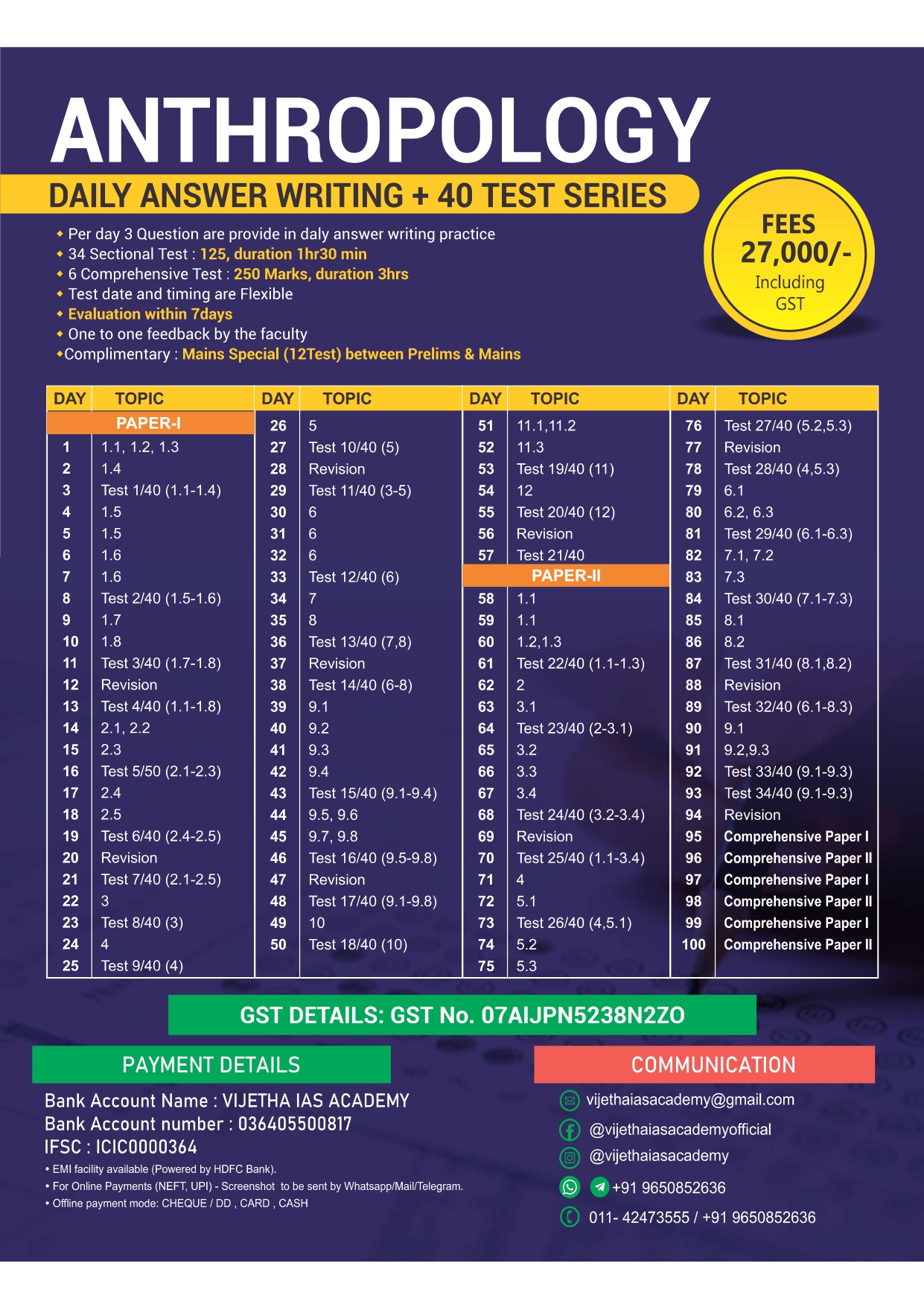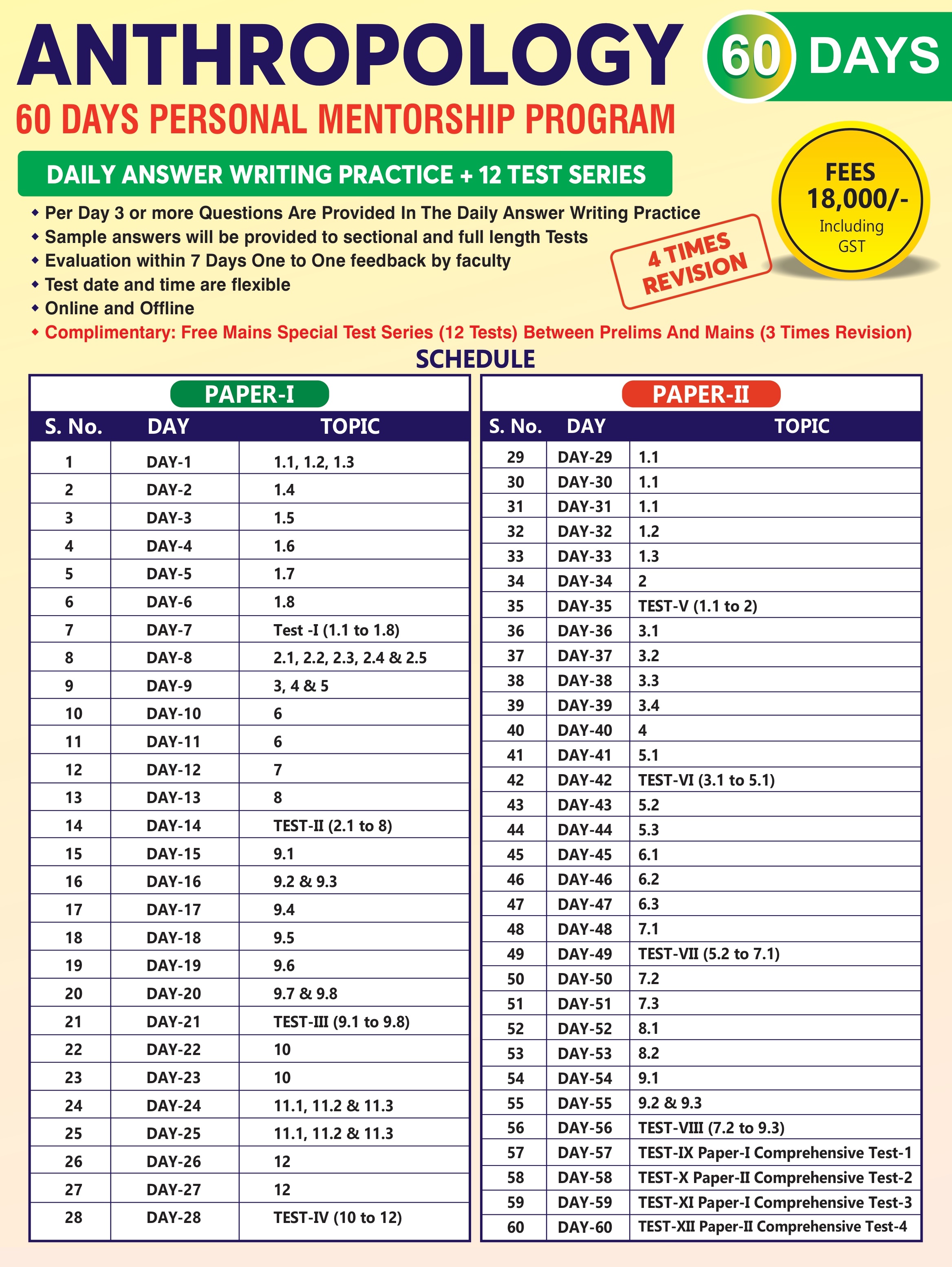
Critically discuss the characteristics of the psychological types in the cultures of the American South-West as observed by Ruth Benedict.
(20 Marks) Anthropology Optional Paper CSE 2024
Introduction
Ruth Benedict, a prominent cultural anthropologist, explored the relationship between individual psychology and culture in her influential work Patterns of Culture (1934). In her study of the American Southwest, she analyzed the distinct psychological types of two Native American groups: the Pueblo and the Plains Indians (primarily the Apache). Benedict's work emphasized how culture shapes personality types, challenging the notion of universal human behavior. She used the concept of "configurations" to describe how cultures create specific patterns of thought and behavior.
Main Body
Ruth Benedict’s Cultural Configurations: Benedict argued that each culture has a unique “personality,” and individuals within a culture internalize and express these configurations. She drew from Friedrich Nietzsche’s dichotomy of Apollonian and Dionysian cultural patterns to describe the psychological types she observed in the American Southwest.
The Apollonian Type: The Pueblo Indians:
Benedict described the Pueblo Indians as having an Apollonian temperament, emphasizing order, restraint, and moderation. Their cultural values revolved around stability, harmony, and adherence to established rules.
Psychological Characteristics: The Pueblo Indians were described as valuing self-discipline, emotional control, and communal cooperation. They discouraged excess and spontaneity, favoring a collective sense of responsibility and peace. Individualism and aggressive behaviors were suppressed in favor of group conformity and cooperation.
Cultural Practices: Religious rituals among the Pueblo were focused on balance and the cyclical patterns of life, reflecting their broader cultural preference for predictability and equilibrium. Ceremonies were calm, structured, and ritualistic, aligning with the Apollonian principle of avoiding emotional extremes.
Psychological Impact: This cultural configuration created individuals who were emotionally restrained, valuing steadiness and predictability. Personal ambition or deviation from societal norms was discouraged, as the culture emphasized the needs of the community over individual desires.
The Dionysian Type: The Plains Indians (Apache):
In contrast to the Pueblo, the Plains Indians, particularly the Apache, exhibited a Dionysian temperament, characterized by excitement, ecstasy, and individualism. This type was more dynamic, emphasizing personal power, spontaneity, and emotional expression.
Psychological Characteristics: Plains Indian cultures valued risk-taking, heroism, and ecstatic experiences. They encouraged individuals to seek out intense emotions, whether through war, hunting, or spiritual quests like vision-seeking. Unlike the Pueblo, where emotional control was paramount, the Plains Indians celebrated emotional release and personal achievement.
Cultural Practices: Ceremonies and rituals among the Plains tribes were often ecstatic and dramatic, such as the Sun Dance, which involved self-sacrifice, pain endurance, and visions. These rituals aimed to foster individual power and connect with spiritual forces in an intense, emotional way.
Psychological Impact: The Plains Indians cultivated a psychological type that embraced individualism and unpredictability. Their culture fostered intense emotions and the pursuit of personal glory, often through warfare, hunting, or spiritual encounters. This led to a more volatile social structure, where personal prowess and emotional expression were valued.
Benedict’s Contribution to Understanding Culture and Personality:
Benedict’s work marked a departure from earlier anthropological models that treated all cultures as following a linear progression. Instead, she emphasized the cultural relativity of psychological traits, showing how cultures mold specific types of individuals based on their values and practices.
She highlighted the non-universal nature of human behavior, arguing that what may seem as "normal" or "abnormal" in one culture could be interpreted very differently in another. For example, the Pueblo’s emotional restraint might be seen as repression in a Dionysian culture, but it was culturally appropriate and valued in their society.
Criticisms of Benedict’s Work:
Oversimplification of Cultural Traits: Critics argue that Benedict’s Apollonian-Dionysian dichotomy oversimplifies the complexity of individual and cultural variability. By grouping entire cultures into these broad categories, Benedict may have neglected the nuances within each culture and the diversity of individual experiences.
Lack of Agency and Change: Benedict’s model implies that cultures are static and that individuals have little agency to deviate from their cultural norms. However, cultures are dynamic and change over time, and individuals often navigate between different psychological types depending on context.
Romanticization of Cultures: Some critics suggest that Benedict romanticized the cultures she studied, particularly the Pueblo Indians, by portraying them as peaceful and harmonious without addressing internal conflicts or complexities within the community.
Contemporary Relevance:
Despite these critiques, Benedict’s work remains significant in anthropology, particularly in the study of the relationship between culture and personality. Her approach laid the foundation for later developments in psychological anthropology, such as the study of cultural models of selfhood and cross-cultural psychology.
Her emphasis on cultural relativity is still relevant in contemporary discussions about ethnocentrism and the importance of understanding cultures on their own terms rather than through a Western lens.
Conclusion
Ruth Benedict’s observations of the psychological types in the cultures of the American Southwest—particularly the Apollonian Pueblo and the Dionysian Plains Indians—offer a critical perspective on the relationship between culture and personality. While her dichotomy of cultural types has been critiqued for oversimplification, her contributions to cultural relativism and the understanding of cultural configurations remain significant in anthropology. Benedict's work continues to influence how anthropologists study the ways in which culture shapes human behavior and psychological characteristics.
Anthropology Test Series Programme (Online + Offline))
We provide Anthropology Daily Answer Writing a range of programs designed to cater to various stages of UPSC preparation. Whether you're just starting out, have attempted the Mains before, or are getting ready for Mains 2024, we have the right option for you. Allow us to assist you in choosing the course that best fits your needs.
|
Level of Preparation |
Test Series Program |
Test Series Content |
Test Schedule |
|
Self-study of Anthropology Optional |
Anthropology 100 Days Personal Mentorship Program |
Daily answer writing, 34 sectional tests, 6 comprehensive tests, and complementary Mains Special 12 tests (between prelims and mains) |
|
|
Revise whole syllabus through Daily Answer Writing Practice and Tests |
Anthropology DAW Mentorship Program |
Daily Answer Writing Practice and 8 sectional and 4 Full Length tests |
|
|
Revise whole syllabus through Sectional and Full Length Tests |
Anthropology Tier- I T-40 Test Series |
34 Sectionals and 6 Full Length Tests |
|
|
Written Mains earlier and need more practice |
16-Anthropology Tier II Test Series |
10 sectional and 6 Full-Length Tests. |
|
|
Cleared Prelims 2023 and are preparing for Mains 2023 |
Mains Special 12 Tests program |
8 Sectional and 4 Full-Length Tests |
ANTHROPOLOGY MAINS SPECIAL COURSES
Enroll in our Anthropology Mentorship Program today and take the first step towards achieving your UPSC goals!
1) If you are going for Self study of Anthropology Optional and looking for a Comprehensive Program that includes Daily Answer Writing, 34 Sectional tests, 6 Comprehensive tests, and Complementary mains special 12 tests (between prelims and mains), our Anthropology 100 Days Personal Mentorship Program is the perfect choice.
2) If you want to revise Whole Syllabus through Daily Answer Writing Practice and 8 sectional and 4 full length tests, then our Anthropology DAW Mentorship Program is the best fit for you.
3) If you want to revise Whole Syllabus through 34 Sectionals and 6 Full Length Tests then Anthropology Tier- I T-40 Test Series is for you.
4) If you have written Mains earlier and need more practice, then our 16-Anthropology Tier II Test Series is a great option. This test series includes 10 sectional and 6 full-length tests.
5) if you have cleared Prelims 2023 and are preparing for Mains 2023,our Mains Special 12 Tests program is a must-have. This program includes 8 sectional and 4 full-length tests to help you prepare for the big day.
For more information on Vijetha IAS Academy’s Anthropology mentorship programs Deatils : https://vijethaiasacademy.com/anthropology-test-series
Anthropology 100 Days Personal Mentorship Program ( 7 + 3 Times Revision )

Anthropology 60 Days Personal Mentorship Program ( 4 + 3 Times Revision )

For more information: https://vijethaiasacademy.com/anthropology-test-series
Details Of Anthropology Classes Program
Top Anthropology Optional IAS Coaching Center in Delhi Vijetha IAS Academy | Best Anthropology Optional IAS Coaching in Delhi
Fee Structure:
- Tier 1: Rs. 55,150/- (3 Years Validity of Offline/Live Batch)
- Tier 2: Rs. 42,000/-
- Tier 3: Rs. 36,000/-
Batch Size: 50 – 60 Students
UPSC Notes
Anthropology Optional IAS Coaching Notes, IAS Exam Preparation Booklets, IAS optional coaching Notes, UPSC Coaching Notes, Video Lectures, Live Classes with faculty, Chat Facility Available
Teachers Name: N P Kishore Sir
Past Result
- Last Years Result 2023
- 35 Total Selections in CSE 2023
Google Reviews: 4.9 out of 5 stars
Website: Vijetha Anthropology Optional IAS Coaching in Delhi (https://vijethaiasacademy.com)
Faculties of Vijetha IAS Academy
- N P Kishore Sir
Features
- Vijetha IAS Academy offers Online and offline Courses for better preparation of Anthropology Optional Strategy for UPSC in Delhi.
- For better Anthropology optional Exam Preparation, Vijetha IAS Academy Delhi Conducts the Motivational IAS Session.
- Vijetha IAS Academy provides you with the CASE STUDIES on the pattern of the real-time IAS Exam which is helpful for better preparation of the Best Coaching for UPSC Anthropology Optional Optional IAS Examination.
- DAW & WAW – Revision Through Daily & Weekly Answer Writing Practice is offered by Vijetha IAS Academy for better result of the Anthropology Optional IAS examination.
Advantages of joining Vijetha IAS Academy
- Best Faculties for Anthropology Optional IAS Coaching in Delhi
- Best facilities, infrastructure and updated Case Studies Booklets and Notes for better preparation of the Anthropology Optional IAS Examination in Delhi.
- Best result in Past years for Anthropology Optional Strategy for UPSC Examination in Delhi
- Best Rated coaching institute for Anthropology Optional IAS Examination in Delhi.
- Vijetha IAS Academy also provides recorded lectures videos, notes which is very helpful for better preparation of Anthropology Optional IAS Coaching in Delhi
Fees Structure of Vijetha IAS Academy
|
Tier 2 |
Tier 1 |
Tier 3 |
BATCH STARTS FROM |
|
42,000/- |
55,150/- (3 Years Validity Offline/Live Batch) |
36,000/- |
REGISTRATION – START |
Fees Structure of Vijetha IAS Academy
|
Course Name |
Fees Amount |
Course Duration |
|
GS Offline (Pre + Mains+ CSAT) with Essay+Answer Writing |
Rs.99,000 (Including GST) |
400+ Days |
|
GS Online |
Rs.18,999 (Including GST) |
400+ Days |
|
GS Mentorship Programme |
Rs.29,999 (Including GST) |
1 Year |
For more information on our courses, visit our Anthropology Courses page. Explore our Test Series and Online Courses for flexible learning options.
Vijetha IAS Academy
Add. 2nd Floor, 50, Shankar Road, Block 7, Old Rajinder Nagar, Rajinder Nagar, New Delhi, Delhi 110060
MOB. 096508 52636
Open 7 Am : Closes 9 PM
Keywords: anthropology 2024 question paper, Anthropology optional subject question paper 2024, Anthropology optionals 2024 question paper, Anthropology Optional Coaching UPSC, Vijetha IAS Academy Anthropology, Anthropology crash course UPSC, Anthropology daily answer writing UPSC, Kishore sir Anthropology, Harappan maritime trade, Indus Valley trade networks, ancient economic systems.
